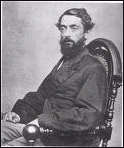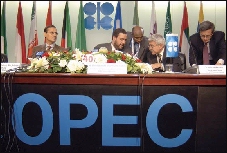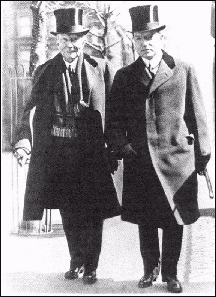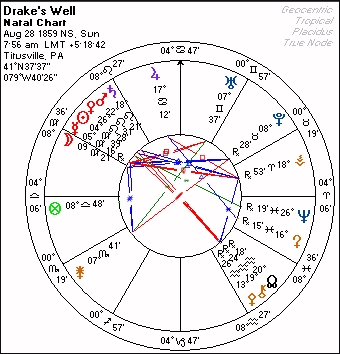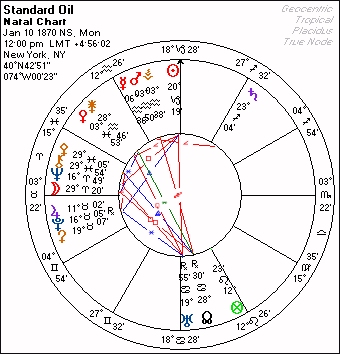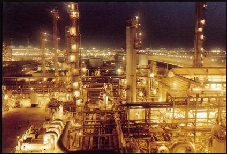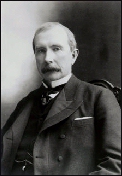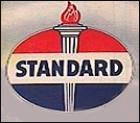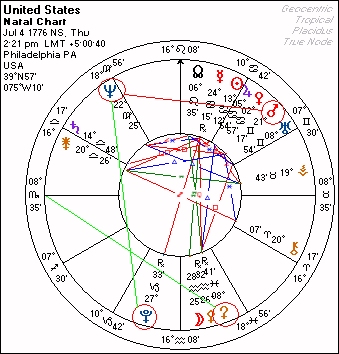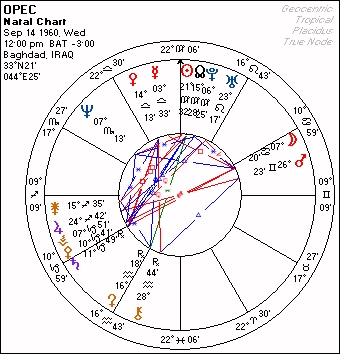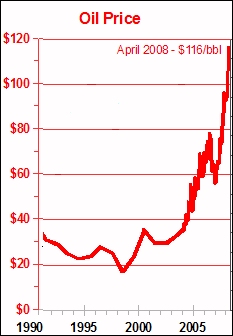advertisements
... NeptuneCafe presents ...
The Astrology of Oil
"Here's Bhukistan. Here's the United States. We have just one thing in common. Oil. Every plan we've made for peace or war depends on that oil. I don't have to tell you what happened in Iran. Half the free world had to learn how to pronounce Mossaddeq.
"Well, the same thing's happening again only this time there'll be lots of new names to learn. And the only way we can get that oil is to get those names on the dotted line."
-- Deborah Kerr in her role as a U.S. State Department official in the 1953 film Dream Wife. The film was released shortly after the CIA-backed coup in Iran that deposed the freely-elected Mohammad Mossaddeq (who
wanted to nationalize oil) in favor of the Shah, who sold cheap oil to the U.S. and Britain.
For the inside story of what drives American-Iran relations, see Mossaddeq and the 1953 coup
Drake's Well and the
Birth of the Oil Industry
The first commercial oil well was drilled in Titusville, Pennsylvania by an innovative pioneer named
An odd twist of fate has juxta-posed the oil-consuming
Oil and the U.S. Economy
In more recent times, the Drake chart remains an accurate lens to view the oil business and its effect on the U.S. and global economy. The Drake horoscope
Christian nations with the oil-producing Islamic nations. Those who say that God has no sense of humor have missed the sublime irony of this co-dependent
and the U.S. Scorpio Rising horoscope share some key points, and so the mutual activation of these points logically correspond to major developments in the oil business that effect the nation as a whole.
Colonel Edwin Drake in 1859. Around the time that transiting Neptune opposed the U.S. Neptune in the mid-1850s, some adventurers were considering using seep oil in lamps instead of the expensive whale oil. Pennsylvania farmers noticed that oil was seeping up through the rocks in some places, and this could be collected and refined for use in lamps. After studying the geology of the area, Colonel Drake began looking for the hidden reservoir of the seep oil.
Deborah Kerr Explains U.S. Foreign Policy
The Drake's Well article was first published by Dell Horoscope magazine in September 2004
by NeptuneCafe's resident astrologer,
Michael O'Reilly.
Drake's Well and the Birth of the Oil Industry
From Oil Futures in Dell Horoscope 2004
Ever since the world’s war machines became dependent on oil, observers have been able to track military developments by monitoring the oil supply lines and primary sources. Major campaigns in World War II were decided by control and access to oil, and Saddam Hussein’s grabbing of Kuwait was likewise a strategy of global domination based on control of oil. Saudi Arabia’s premier standing in global financial markets and Middle East geopolitics derives from its estimated oil reserves of 260 billion barrels - by far the largest in the world.
The first commercial oil well was drilled in Titusville, Pennsylvania by an innovative pioneer named Colonel Edwin Drake in 1859. Around the time that transiting Neptune opposed the U.S. Neptune in the mid-1850s, some adventurers were considering using seep oil in lamps instead of the expensive whale oil. Pennsylvania farmers noticed that oil was seeping up through the rocks in some places, and this could be collected and refined for use in lamps. After studying the geology of the area, Colonel Drake began looking for the hidden reservoir of the seep oil.
The world’s first monopoly over a strategic resource was John D. Rockefeller’s Standard Oil, and it made him and all his heirs billionaires. The commercial development of oil remains in the hands of a few multinational corporations, and their dominance determines our collective political realities. Their campaign donations get favored politicians elected, which in turn shape the environmental regulations, foreign policy, and energy policy. The petroleum industry gets extraordinary tax breaks which more than compensate for the original campaign donations. One can trace the petroleum industry back to the world’s first commercial oil well, and from that point create a horoscope which reflects historical and current trends in the oil business.
He invented the drive pipe and slowly drilled through the shale. On the morning of August 28, 1859 at a depth of 69 feet he finally discovered oil bubbling up through the shaft. He gathered up the oil in local whiskey barrels at the rate of about 10 barrels a day. The oil industry was born.
The horoscope for this event is rectified to 7:56 am; August 28, 1859; Titusville, PA. This chart features the Sun in early Virgo square Uranus. This configuration describes the new rigging technology (Uranus) used by Drake, and the detailed analysis of the Pennsylvania countryside to locate a good site (Virgo).
The Sun is conjunct Mercury and the Moon, and all three are empowered by a trine to Pluto, which shows the immense transformational power inherent in this horoscope. Pluto is placed at eight degrees Taurus, right on the U.S. Descendant, further describing the potential for changing the nation and eventually the world.
Neptune is strongly placed in its own sign Pisces, where it forms the tightest aspect in the entire chart with Venus, the ruler of the horoscope (since Libra is Rising). Venus in majestic Leo tightly linked to Neptune, the planet of dreams and big hopes, describes the El Dorado fascination that characterizes the early explorers and venture capitalists seeking to make their fortune by discovering new oil reservoirs.
The asteroid Ceres, popularly known as the Great Mother and the Goddess of the Grains, is also in Pisces, perhaps describing the farm fields where oil was discovered. Ceres is a benefic, and may be correlated to how the Earth Mother bestows her bounty in the form of oil for the well-being of humanity. (In the U.S. horoscope Ceres is also in Pisces.)
Major transits and progressions to the Drake horoscope correspond to major developments in the oil business.
A good example is the Lucas Gusher, which made Texas the new center for U.S. oil reserves. On January 10, 1901 an adventurer named Pattillo Higgins struck oil near Beaumont, Texas. This wasn’t an ordinary oil find but a surprising gusher that shot up 150 into the air, and began producing the unheard sum of 100,000 barrels a day. This well launched oil as one of the largest global industries of the twentieth century, and led to the foundation of Texaco, Gulf, Mobil, and Humble Oil companies. The transits on January 10, 1901 demonstrate the underlying importance of the Drake horoscope.
Transiting Neptune is making its opening square to the Drake Neptune, showing how the oil business was making a dynamic shift from Pennsylvania to Texas. Transiting Saturn at eight degrees Capricorn is exactly trine to Drake’s Pluto, an institutionally empowering event. The closest transit to the Drake horoscope is transiting Pluto’s precise square to Ceres, further redefining the oil business as a death and re-birth. The benefics Jupiter and Ceres by transit are both closely aspecting the Drake Venus, bringing fame and fortune to Texas and its early wildcatters.
The discovery of oil at Drake's Well marks the Birth of the Oil Industry.
In both these cases, Standard Oil was the key player. In Texas, Mobil was a front for Rockefeller’s Standard Oil which wasn’t allowed to invest in the Upper Gulf Coast region. Likewise, Standard Oil of California was formed as a legal maneuver to get around the Sherman Anti-trust Act which was implemented to reign in Rockefeller’s unfair advantage .
Standard Oil itself was incorporated on January 10, 1870 as transiting Neptune squared Drake’s Jupiter, which is located in the tenth house of business.
Neptune’s next quarter cycle took place in 1938, and once again shifted the focus. The desert kingdom of Saudi Arabia granted prospect rights to the Standard Oil Company of California in the early 1930s. On March 3, 1938 a commercial source of oil was discovered at Damman Well #7, and eventually led to making Saudi Arabia one of the richest nation’s in the world. At the time transiting Saturn was entering the seventh house, reflecting the emergence of a new player in the oil business. Also, transiting Uranus was conjunct the Drake Pluto, where it emphasizes a powerful awakening of a new financial superpower (this combo took place in the financially-savvy sign of Taurus).
Rockefeller, who was born on July 8, 1839 was uniquely placed to take advantage of the Drake dynamics since his Sun at 16 degrees Cancer is almost exactly conjunct the Drake Jupiter. He became the embodiment of the Drake Jupiter by expanding the oil business, prospering by it, and establishing a family dynasty through his monopoly.
Uranus and Neptune Shape the Global Village
An odd twist of fate has juxtaposed the oil-consuming Christian nations with the oil producing Islamic nations. Those who say that God has no sense of humor have missed the sublime irony of this co-dependent relationship. But astrologers who take the third perspective, that is, viewing events from a non-religious angle, may better understand how oil and religion are shaping our global village.
Most significantly, oil and the current dominant religions on our planet are related to Neptune and the waning Age of Pisces. Tracking oil and the clash of civilizations based on traditional religions means tracking Neptune and any major planets traveling through Pisces. As it happens, Uranus is in Pisces now, and remains there until March 2011. Uranus, the planet of technology, independence, and revolution is shaking up the oil markets, and the geopolitical interface between the world’s major religions.
Through February 2012 Neptune is in Aquarius, the sign traditionally linked with equality, justice, and fraternity. In more geopolitical terms Aquarius is connected with national alliances, global or regional associations, and the emerging democratic ideals in countries historically governed by monarchs or dictators.
Neptune, the planet of ideals, is inspiring a global move toward more egalitarian societies, and this includes giving women the right to participate in Islamic countries, and the people more control over the governments. Neptune, as the natural ruler of oil, also infers that the oil-producing nations have unusual leverage in shaping regional alliances, trade organizations, and geopolitics in general through February 2012.
Uranus and Neptune are traveling through each other’s signs, Pisces and Aquarius. This unique interchange is known as “mutual reception”, and strengthens each planet and its symbolic message. Astrologers can take the key words for these planets and signs and discover a variety of trends that should continue as long as these two planets are in mutual reception, which is through 2011.
For example, Uranus represents the radical, the anarchist, the revolutionary. In the faith-oriented sign of Pisces, Uranus here represents the terrorist, or the martyr willing to die for a cause. From the American foreign policy viewpoint it may also be the desire to bring freedom and democracy to the Islamic nations, with the sub-text of more American control over the oil supply. Pisces can be seen as the oil fields themselves, and Uranus in this sign brings the disruption of the oil flows.
Neptune, as the signature for the true-believer, may try to bring religion to the democracies when in Aquarius. Neptune dissolves borders and can mean the dissolution of democratic ideals. Aquarian views take in the Big Picture, how everything all fits together in a systematic way. Neptune here idealizes the utopian vision, and for the first time in history, makes it possible to consider a global government. From a regional perspective, the Christian nations see themselves as showing the way to a global economy, while Islamic nations look toward a Pan-Arab nation.
Getting beyond a local religion or ideology remains the main obstacle to creating a worldwide, egalitarian, just system. Still, everywhere nations are learning how to integrate themselves into the global market economy. Neptune’s rulership over oil describes how this commodity in particular is shaping the world trade organizations and the evolving, free-market system.
Oil and the U.S. Economy
The U.S. horoscope reveals the importance of oil to the general well-being of the economy. Mars and Pluto, the co-rulers of the Scorpio Rising chart, are both closely aspecting Neptune. Mars is found in the eighth house of corporations where it’s associated with military contractors, manufacturing industries, and those based on metals, including the automobile industry (Mars is in the transportation sign of Gemini). Oil achieved its premier place in the American economy when the gasoline-driven automobile overcame the electric automobile in the early twentieth century. Ever since then, the supply and demand for oil has had a direct impact on the economy’s well-being.
In the Scorpio Rising horoscope Ceres is exactly trine the Ascendant. Many astrologers miss this important link, but Ceres in Pisces represents, among other things, the Earth Mother’s gift of oil. The harmonious trine reflects the bounty of oil as a cheap energy supply. In broader terms, Ceres can be imagined as the Statue of Liberty. The myth of Ceres includes her search for her kidnaped daughter in Hades, where she pushes through the darkness with a flaming torch in hand.
So Ceres is associated with the torch, and in compassionate Pisces, she’s the one who welcomes “The wretched refuse of your teeming shore.” She’s the one who pleads, “Send these, the homeless, tempest tost to me.” And with Ceres exactly square Uranus, the planet of freedom and liberty, the poem on the Statue of Liberty famously says, “Give me your tired, your poor, your huddled masses yearning to breathe free.” Ceres is the Goddess of Democracy, and again her trine to the U.S. Ascendant represents America as the bastion of freedom, and a safe harbor for the world’s destitute. However, for the purpose of this article, the U.S. Ceres in Pisces might be referred to as the Goddess of Oil.
In 2005 transiting Uranus will be conjunct the U.S. Ceres twice, with a third and final pass in January 2006. The disruptions suggested by this major transit find parallel developments in the Drake horoscope. Transiting Uranus opposes the Drake Sun, Mercury, and Moon and squares the Drake Uranus throughout 2005. The simultaneous Uranus hits to both these horoscopes underscores a turbulent oil market. How serious could it get?
on the U.S. since President Nixon was seen as favoring Israel.
On October 6, 1973 transiting Saturn and Pluto were squaring each other. This planetary situation was dire enough in its own right, but Saturn and Pluto were also exactly on the Drake Midheaven and Ascendant. Also, transiting Neptune was closely squaring the Drake Sun.
All these planets were simultaneously hitting the U.S. Venus-Jupiter conjunction where they put a significant dent in American confidence and feelings of prosperity. The Arab OPEC nations became empowered while the oil-dependent nations reeled in recession for nearly two years. The term “petrodollars” was coined, and oil, the economy, and religious warfare became hopelessly enmeshed for the first time.
OPEC itself was founded on September 14, 1960 (noon Baghdad). This horoscope shows strong developmental tension with the Drake horoscope, with all three of the outer planets forming hard aspects to the Drake horoscope. Primarily, OPEC’s Neptune is exactly opposite Drake’s Pluto, which aligns with the U.S. Scorpio Ascendant. They’re all powerfully interconnected: OPEC, Drake, and the U.S.
Editor's note: The article here was written in 2004 and forecast a turbulent oil
market in 2005. In fact, prices broke out on the upward side in 2005, but more significantly, that upward trend continued through 2008.
Oil is the key commodity as we collectively shift from the
Age of Pisces to the Age of Aquarius. When Uranus-ruled alternative fuels replace Neptune-ruled oil, the transition is complete. Here's where you'll find horoscopes relevant to tracking oil, including the foundation of the Oil Industry.
A look back at previous recessions offers some clues. Economists generally agree that unexpected and sudden increases in oil prices invariably lead to recession. The most dramatic of these was when OPEC quadrupled its prices beginning in October 1973 and through 1974. The
U.S. was hit immediately by a severe recession which lasted between November 1973 and March 1975. The activating agent for these price increases was the Yom Kippur War which began on October 6, 1973 when Israel’s Arab neighbors staged a surprise attack. The Arab-dominated OPEC countries issued an oil embargo
Uranus and Neptune
in the Age of Pisces
relationship. But astrologers who take the third perspective, that is, viewing events from a non-religious angle, may better understand how oil and religion are shaping our global village.
 more
more
Richard Tarnas
on the cosmos
Astrology is not concretely predictive, but archetypally predictive."
"The modern dismissal of astrology reflects the virtually universal conviction that the cosmos is disenchanted."
"The universe is a fundamentally and irreducibly interconnected whole, informed by creative intelligence and pervaded by patterns of meaning and order that extend through every level, and that are expressed through a constant correspondence between astronomical events and human events."



